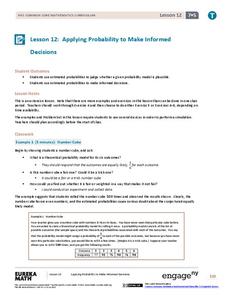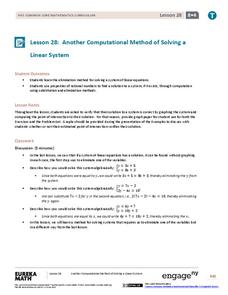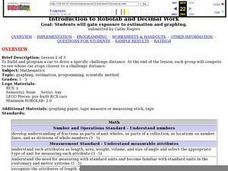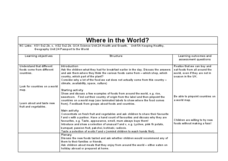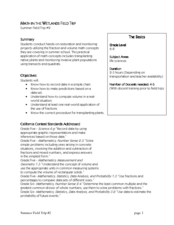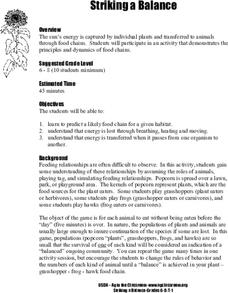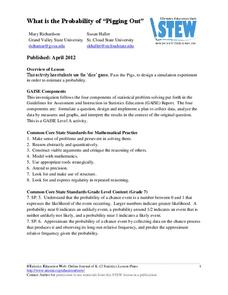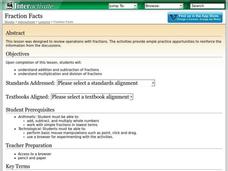EngageNY
Applying Probability to Make Informed Decisions
Use simulations to determine the probabilities of events to make decisions. Class members are presented with several scenarios, some with known probabilities and others without. Groups run simulations to gather data that they then use to...
EngageNY
Another Computational Model of Solving a Linear System
The process of elimination really works! Use elimination when substitution isn't doing the job. The 29th segment in a series of 33 introduces the elimination method to solving linear systems. Pupils work several exercises to grasp the...
Laboratory for Atmospheric and Space Physics
Planetary Distances on the Playground
There's no need to stay inside; get out of the classroom and create a scaled map of the solar system on your playground field! In collaborative groups, scholars identify the distance between the sun and other planets, place planet...
Curated OER
Pump It Up!
Students design a pumping device that will effectively pump fluid through a model "cardiovascular system." They explore the effects of too much and too little pressure on a circulatory system.
Indiana Science
How Many E’s?
Seventh graders explore random sampling by estimating the number of e's on the newspaper. They explain the possible error sources for this type of sampling, and compare the accuracy of sampling a small and large population. This is a...
Curated OER
Go The Distance Car Construction
Students build and program a car to drive a specific challenge distance.They must at the end of the instructional activity, have the car that stops the closest to a challenge distance.
Curated OER
Minnesota-China Connections:What Time Is It?
Students calculate the time difference between Beijing, China and their local community. They discuss how time difference affects intercultural communication.
Curated OER
"Mind Reader" Math Trick
Students perform a math-based card trick and explain the concepts behind the trick. They video tape classmates performing the trick. Finally, they write a paragraph explaining the trick.
Curated OER
Where in the World
Students explore the global grid system. In this globe lesson, students identify latitude and longitude lines and how these can tell the coordinates of any place. They use the Internet to find the exact coordinates for their town.
Curated OER
Sharks in Decline
Learners investigate common fishing methods used to capture sharks. They decide why these methods and the shark's reproductive biology are contributing to the quick reduction in the shark population.
Curated OER
Bye, Bye, Bye, Fraction Phobia!
Young mathematicians utilize video, the internet, and hands-on learning experiences in order to recognize that fractions aren't as "scary" as they first appear, and that we use them every day in our lives. The hands-on activities in this...
Curated OER
It's Not All Greek to Me
Learners find out the meaning for prefixes used in math vocabulary. By dissecting words used in everyday math, they figure out what the prefix indicates and what the word means. A variety of well-organized worksheets and activities...
Curated OER
What a Square
Students examine the painting "Old Man With A Gold Chain" by Rembrandt. They identify geometric shapes in the painting, measure these shapes and compare the relationships of these measurements.
Curated OER
Math in the Wetlands Field Trip
Get your class out in the environment for hands on math activities. In this wetlands lesson, learners transplant native plants, calculate how much soil is needed, and perform math activities based on this experience. They then make...
Curated OER
Getting it Right! An Investigation of the Pythagorean Theorem
In order to learn about the Pythagorean Theorem, young mathematicians investigate relations and patterns between different sides of a right triangle to look for possible relations among the squared sides. Once they have established the...
Curated OER
Cutting Corners - Parts 1 and 2
Students use optimization concepts to design their own container. In this optimization lesson plan, students understand how the optimization concept is critical in calculus and why products are packaged the way they are.
Ohio Department of Education
Word Origins
Understanding a word's etymology can really help with decoding and building vocabulary skills. Readers compare and contrast words of similar origins but with different difficulty levels. They focus on prefixes, suffixes, and affixes....
Education World
Predicting Pumpkins
If you want more pumpkin seeds, you should get a bigger pumpkin—right? Young harvesters use estimation skills to make a hypothesis about how many seeds they will find in a pumpkin before examining the real number inside.
EngageNY
Multiplying and Dividing Expressions with Radicals
That's radical! Simplifying radicals may not be exciting, but it is an important skill. A math lesson provides explanations of properties used throughout the material. Scholars practice skills needed to multiply and divide radical...
Curated OER
Striking a Balance
Students demonstrate understanding of food chain by assuming roles of animals, playing tag, and simulating feeding relationships.
Curated OER
Striking a Balance
Students explore the many different food chains. They participate in a game in which the class is divided into the different parts of the food chain.
American Statistical Association
What is the Probability of “Pigging Out”
Learners apply their understanding of luck to a probability experiment. They play a game of Pass the Pigs to determine the probability of a specific outcome. Using analysis for their data, pupils declare the measures of center, dot...
Salt River Project
How Do We Clean Polluted Water?
How do we clean up oil spills and other pollutants in the water? Explore water treatment strategies with a set of environmental science experiments. Groups remove oil from water, work with wastewater treatment, and perform a water...
Curated OER
Fraction Facts
Middle schoolers explore the concept of fractions. In this fractions lesson, students perform basic operations such as addition and subtraction with fractions. Middle schoolers play a game on the computer called 'Fraction Four' that...


